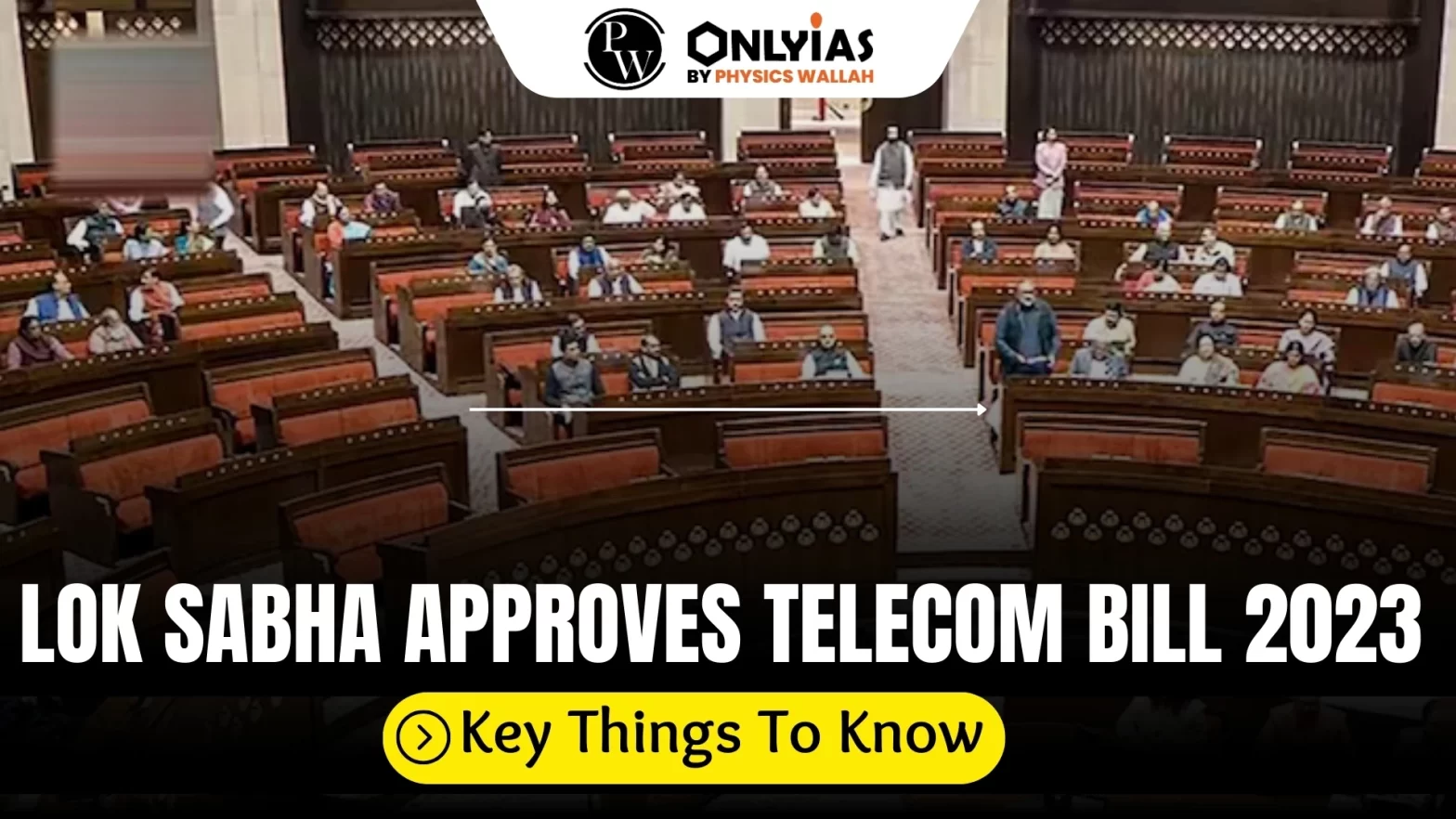Context: This article is based on an Editorial “Lok Sabha approves Telecom Bill 2023. Key things to know”which was published in the Economic Times. On Wednesday, the Lok Sabha approved the Telecommunications Bill, 2023. The bill’s aims to promote structural reforms in the telecom sector.
Telecom Bill 2023: Aim
- Streamlining Telecom Activities: Telecom Bill 2023 aims to streamline the existing licensing system for telecom networks by transitioning to an authorization system.
- Overhauling Telecom Legislation: It repeals the Indian Telegraph Act, of 1885, the Indian Wireless Telegraphy Act, of 1933, and the Telegraph Wires (Unlawful Possession) Act, of 1950.
Telecom Bill 2023: Need
- Transformation of Sector: The telecommunication sector has witnessed significant transformations in the past decade, including changes in its nature, usage, and underlying technologies. For example, 5G technology and its application.
- Revamp of Archaic laws: India is a huge market for telecom and internet companies. However, the telecom sector in India was largely governed by three laws, two of which were made in colonial times and the third in the year 1950.
Telecom Bill 2023: Key Features
- Authorisation for Telecom-related Activities: Prior authorization from the central government will be required to provide telecommunication services, establish, operate, maintain, or expand telecommunications networks and possess radio equipment.
- Assignment of Spectrum: Spectrum allocation will predominantly occur through auctions, except for specific use cases, where allocation will be done on an administrative basis.
- Interception of Messages: Messages between two or more persons may be intercepted on the specified grounds of security of the state, prevention of incitement of offenses and public order.
- Suspension of Telecom Services: The Telecom Bill 2023 allows the central government to temporarily take control of telecom services in case of an emergency and in the interest of national security.
- Guidelines for Press Messages: The press messages accredited to the Central or a State Government shall not be intercepted or detained unless their transmission is prohibited under the applicable rules.
- Guidelines for Unutilised Spectrum: The Telecom Bill 2023 allows the government to take back a spectrum that is unutilised for insufficient reasons and also opens the door for sharing, trading, and leasing of the spectrum.
- Grievance Redressal: The dispute resolution process for breaches of terms and conditions includes a tiered structure, including an adjudicating officer, a designated committee of appeals, and the Telecom Disputes Settlement and Appellate Tribunal (TDSAT).
- Cyber Security Measures: The central government may provide rules for ensuring the cyber security of communication networks and services.
- Powers to Specify Standards: The central government can prescribe standards and assessments for telecom equipment, infrastructure, networks, and services.
- Right of Way: In order to install telecom infrastructure, facility providers may request a right of passage over public or private property.
- Protection of Users: The central government may implement measures to safeguard users, including obtaining prior consent to receive specific messages, such as advertising messages and mechanisms to allow users to report malware or specified messages.
- Appointments to TRAI: The Telecom Bill 2023 amends the TRAI Act to allow individuals with at least 30 years of professional experience to serve as the chairperson and at least 25 years of professional experience to serve as members.
- Priority Transmission of Messages during Disaster: During any public emergency, the Centre or a State government may temporarily seize any telecommunication service.
- Digital Bharat Nidhi: The Telecom Bill 2023 renames the USOF as Digital Bharat Nidhi and allows its use for research and development.
- Authority to Waive fees: The bill vests the power with the government to waive off entry fees, license fee, penalty etc. in the interest of consumers.
Telecom Bill 2023: Concerns
- Privacy Concerns: To curb fraud, entities are mandated to carry out biometric authentication of their users. This raises concerns related to the privacy of users.
- Ambiguity in Definition: The new definition of ‘telecommunication services’ has been kept generic and is prone to wide interpretations.
- Possession of Network: The Telecom Bill 2023 gives the government the authority to “take temporary possession” of the network.
- Potential Misuse of Power: The bill empowers the central and state governments to suspend communication during any public emergency’ or ‘in the interest of public safety’. This power could be misused to curb dissenting voices.
- Restrictive Powers of TRAI: The draft also seeks to allow the appointment of private sector corporate executives for the role of TRAI chairperson.
- Spectrum allocation: Private telecom companies are divided on this matter.
Conclusion:
The Telecom Bill 2023 represents a progressive step towards the telecommunication reform process. However, concerns raised by the stakeholders should be addressed.
Must Read: Regulation Code For OTT Platforms In India
![]() 20 Dec 2023
20 Dec 2023
